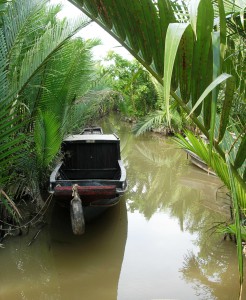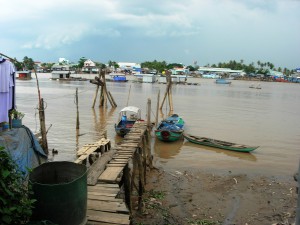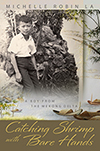On the 29th of April 1975, helicopters evacuated people from the roof of the U.S. Embassy before the fall of Saigon. Twelve-year-old Luong La stood on a dock on the bank of the Mekong River and watched the entire Navy go out to the ocean that day. Here’s his story of the days leading to South Vietnam’s unconditional surrender:
(excerpt from Catching Shrimp with Bare Hands)
I put a basket of ripe soursops in my canoe and paddle through the canals to the place where Chị Mộng’s in-laws usually tie their boat up to buy fruit. On my way, I pass Mr. Six Soybean’s house. No clothes or pots hang outside. He left the countryside over a week ago. I listen for other boats or the rumbling noise from a distant firefight. All I hear is the canoe gliding over the water and the stroke of my paddle hitting the side to nudge it away from the water coconuts on the bank.
“Chào, Cô Tư,” I say to Chị Mộng’s mother-in-law when I get to the side of their large boat. It would be nice if she had a package for me from my family in Tân Long or bought me some bánh like I asked. I hop on her boat and hand her the basket of ripe soursops.
She puts them into a flat bamboo basket so that there’s only one layer and hands back my basket and some money. “Sorry, Lượng, I didn’t see any good bánh today.”
That’s alright. I can use the money to buy some candy at Aunt Curly’s. I can’t spend too much, though, because Chị Mộng’s in-laws always tell Má what they paid me.
“No package either, but your mother sent a message. She wants me to tell you ‘Don’t be a lost bird flying away from the flock.’”
I laugh. What a strange message. I guess Má wants me to go home, but Chị Mộng’s in-laws are already packing up to head back. “I understand,” I say. “I’ll leave with you the next time I have fruit to sell.”
Two days later, Chị Mộng’s mother-in-law walks all the way to my hut. “Your mother sent another message. You need to go home today. We’ll wait for you.”
I run out and harvest a soursop I’ve been watching and a few other pieces of fruit. They need another day to get ripe, but if I don’t take them now they’ll go bad by the time I get back. I put the fruit in a plastic net bag along with my clothes and the rest of the rice. After I hide the knives and lantern and check that the canoe is tied to a water coconut, I walk through the island to the fruit wholesaler’s boat.
The boat turns out of the leafy passages of Cồn Tàu and into the wide open river. It’s too stuffy to sit in the covered area with the baskets of soursops, betel nuts, and guavas. I move between sitting on the roof with Chị Mộng’s mother-in-law and her son and standing in the open back next to the motor and her husband, who steers with a pole connected to the rudder. There’s nothing to do but look at the brown water curling away from the boat and the trees hiding the edge of the shore next to us. No ghost bodies float in the river. There weren’t any on the way down either and I haven’t heard much gunfire. Why have we stopped fighting? The news on the radio is that the Army is fleeing—they must be retreating into position to make their last stand. In history books there’s always a heroic battle at the end. No one just gives up. We pass the stream that leads to our old home in Quới Sơn. We already fled once. Where can we go now?
It’s evening when we get to the fruit vendor’s dock in Tân Long. There are only a few boats tied up. The street is full of people waiting to see what will happen. Small boats travel back and forth across the river.
I find Má in her room. “Good. You’re here,” she says. “Go upstairs and pack your clothes.”
“How are we going to leave?” I ask.
“There’s a way.” Má has several big travel bags filled and hidden in her bedroom. “Now we’re just waiting for your older sisters. I sent a message to Thanh and Lan a week ago. They’re still not here. Where are they?” She paces the house searching for things to take, trying to keep the front room looking normal so no one knows we’re planning to leave.
I put some shorts and a couple of shirts in a plastic rice bag, but I know we’re not going anywhere with my two oldest sisters still at nursing school. And Ba hasn’t packed anything.
***
The next morning, Mr. Three East mutters to himself as he patrols up and down the street in front of our house. He’s the only member of the Civilian Self-Defense still around. Whenever he runs into soldiers he asks, “Are you on break? Why are you home?”
“Our unit disbanded. We didn’t have anywhere to go,” a soldier answers, “so we put our arms down and came home.”
They’re running away from the fight.
Ba sees Mr. Three East walking by our house and calls him in for tea. I get the teapot out and set it on the table. “That’s it,” Mr. Three East says, “they’ll surrender soon. Everyone fell out of line. The Army is a snake without a head now. The head was chopped off a while ago.” He gulps down his tea and walks back to his house.
Two soldiers stop by the next evening. Má brings them to the dining area in the back of the house. I follow, along with my brothers and the sisters who are home. “Are you coming?” one of the soldiers asks Má.
“I’m waiting for my two oldest daughters,” she says.
Ba steps in from the back room of the lean-to.
“It’s hard to have everyone together,” the soldier says. “Why doesn’t your husband stay and wait? We’ll send another boat for them.”
“What if the carriers aren’t there?” Ba asks. “Can we go to Thailand?”
The soldiers shake their heads. “No. There’s not enough fuel.”
Má tells the men to wait in the front part of the house while she and Ba talk. She chases all of us kids out. I can’t hear what Má says, but Ba shouts, “Do you want to kill us all?”
Má comes out alone. “Is there a wave after this one?” she asks the soldiers.
“All the big ones are going in the next twelve hours,” one of them says. “All the troop carriers and transports. This is a well-armed convoy and it’s being escorted. Only small patrol boats will be left.”
“We need more time.”
“You have to decide now.”
The soldiers leave without an answer. My parents argue for hours. “You don’t know where they’re going,” Ba says. “The Army says the carriers will be there, but other people say you’re just going out to drown or get ambushed by the Communists or even shot by the Americans. If it doesn’t work we can’t come back. We’ll be traitors. Our house will be ransacked the second we close our door to leave.”
Aren’t the Communists supposed to be worse? After all of Ba’s talk about how bad Communism is, why are we staying?
***
When I wake up the next morning, Má is already gone. Chị Tư tells me she went to Mỹ Tho. From our balcony I watch boats of all sizes stream south toward the mouth of the river. They’re staggered, three in a row, then two. Large ships, metal freighters, and troop transports in the middle with gunboats rocketing down alongside them, pushing up waves. For the first time, the Mekong looks small.
I walk out to watch the parade of boats from the end of the foot ferry dock. People stand around watching in front of Six Chicken’s house. “There goes the whole Navy,” someone says.
They’re abandoning us.
Soldiers step off small passenger ferry boats onto the dock, saying, “It’s over.” Everybody expects a final battle at the Army base along National Road 4. But how it will happen with all the soldiers coming home?
A woman selling steamed yams to the people gathered around says, “I have to work . . . Communists or not . . . my family has to eat.”
People look around for any anti-Communist posters near their homes and peel them off. Mr. Three East walks by without stopping. He’s not wearing his uniform or carrying his gun.
Two men carrying a steel desk get off a small ferry boat. The boat owner says that over in Mỹ Tho people have started looting abandoned offices. Smoke billows out of public buildings from officials burning documents.
Women on a troop transport ship wave at us and point downriver toward the ocean. A soldier comes out and walks among them. The women stop. He leaves. The women start waving again and pointing downriver. Another soldier comes out and gestures them to get below. We should be on one of the transports. Even though we’ve stopped fighting, we should be with the side that’s free. Not stuck back here with the Communists. What is Má doing? Shouldn’t she be back by now?
Every once in a while there’s a rumble in the distance. Some Army soldiers say it sounds like a B40 rocket-propelled grenade launcher. Still, it looks like the convoy will make it without being attacked. “What happens when they get to the ocean?” someone asks.
“They’ll drown,” a couple of people answer at the same time.
“No they won’t,” says a soldier who came home today. “The carriers are out there. The carriers will pick them up and take them someplace.”
“What if you manage to get to the carriers, then what will happen to you?” an older man asks.
“They’ll probably go to Thailand, create a camp so they can come back and retake Vietnam,” the soldier says. Another soldier nods.
“Come back and fight? With what?” the man says. “Where will they get troops or equipment? No, if you get on one of those boats, it’s a one-way ticket.”
He’s right. I’d like to find out where the one-way ticket goes, though. China has Taiwan and North Korea has South Korea. Where will we go? To some tiny island somewhere? Wherever it is will be freedom.
I jump in the river to cool down. Transport ships stop along the way to pick up people who come out to meet them in small ferry boats. Maybe I could hire a ferry to take me out. Then I’d wave at one of the transporters going by to have it stop for me. All I’d have to tell them is that my father is already on a carrier.
A few hours later the boats are gone except for a transporter going full-tilt down the river every once in a while. Má comes back late in the afternoon. “I watched the convoy this morning,” I say. “Are we going to be picked up?”
“We’re waiting for your sisters,” she says. “We’ll all go together.”
It will be too late. And even if my sisters were here, I don’t think Ba would let us leave.
***
The next morning, I’m out in front of the house waiting for something to happen. The news comes from behind me on an old radio with transistors showing through a missing side panel—one the owner didn’t stop by to pick up. My parents listen at the table inside with my older sisters. My brothers and younger sisters sit outside on the steps. I wander in and out. Every once in a while some small-arm fire or grenades go off in the distance. Each time, I hope it’s the start of our final fight to push the Communists back.
All at once, people on the street say that it’s an unconditional surrender. I run back inside. The voice of the Army general who’s been our president for only two days comes over the radio: The Republic of Vietnam’s policy is the policy of peace and reconciliation, aimed at saving the blood of our people. I ask all the Army to stop firing and stay where you are. I ask our brothers in the Provisional Revolutionary Government to stop firing and stay in place. We wait here to hand over authority to the Provisional Revolutionary Government in order to stop useless bloodshed. The tape repeats and the unconditional surrender starts again.
I thought we had more time.
Ba walks over to the table with the teapot and turns on a small black and white TV mounted on the wall. The same general is at Independence Hall announcing the surrender. It seems more official on the screen.
On the street people say, “Unconditional? How can that be?” “He was supposed to be negotiating for us . . . he must have been working for the North all along.”
I come back inside to see what we need to hide. We hid most of the tape players and TVs earlier. Má moves through the house looking for any flags or symbols of South Vietnam to take down. She finds the flag from the boat and takes it off the pole. Then she gathers up some paper flags on sticks and pulls down posters. She puts the pile of yellow in the kitchen fireplace and lights it. All around us, we smell our neighbors’ flags burning too.
I go around to the back of the house and climb onto the thick tin over the kitchen, the only place that I can stand now without crushing the roof. The South Vietnamese flag painted on our rooftop has already faded away. No need to scrape it off. I stop to listen, hoping there’s going to be one last fight, but there are only small bursts of gunfire in the distance. A few boats rush downstream. Is it too late for us to go?
I spend the rest of the day waiting for something to happen. In the evening, people stand outside in the street whispering and watching the sun set. As soon as the sun goes down it’s completely dark. No one has house lights on. For the last three weeks there hasn’t been any diesel for the town generators. Someone points overhead to a new formation in the stars—shoots coming off a handle, like a broom. I look at stars all the time in the countryside, and I haven’t seen a constellation like this before. “It’s a sign from the sky that we’ll be swept aside,” people tell each other. “The Communists will sweep away our wealth, our food, our lives, everything.”
I don’t need the stars to tell me it’s going to be bad.
Read the rest of the story: Catching Shrimp with Bare Hands: The Boy from the Mekong Delta is now available.






sipqwx
Hello to every single one, it’s in fact a good for me to visit this website, it includes valuable Information.
Wow! At last I got a weblog from where I be able to genuinely get valuable data regarding
Hi there, how are things? I recently discussed this short article with a colleague, we’d a good snicker.
So fantastic to see these photos. Thank you!
Thanks for reading!
Pingback: A Short History of South Vietnam Through Stamps | Michelle Robin La
Lovely written Michelle, I can’t wait to read the rest of the book. You really give good details so it feels that you are there.
I wish I knew how to pronounce the Vietnamese names.
The Internet and e-books open up so many possibilities for this. Of course there could also be a pronunciation guide for a printed book.
I am so happy to read such a personal detailed account of what the experience was at the end of the war in Vietnam.
This is a fantastic juxtaposition of serenity and panic, the emotions experienced in a life changing moment.
Beautifully written.
A sad and agonizingly long day that felt like never ending. I have read other historical accounts of this event but this one feels so real, with its understated emotion flowing casually.
On a somewhat related note, it is such an irony that, shocked by the extreme brutality of their neighboring “comrade and brother” the Vietnamese regime wiped out Pol Pot only three years later, a stunningly short transition from the end of the beginning to the beginning of the end.